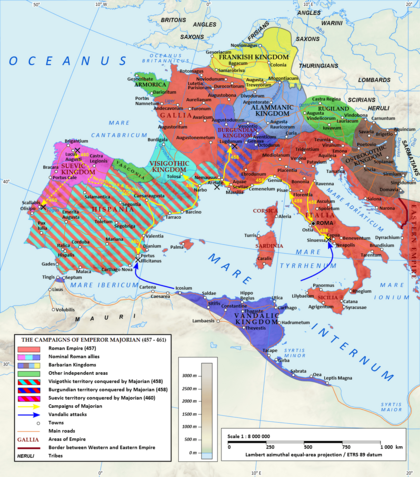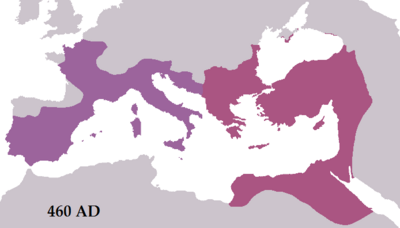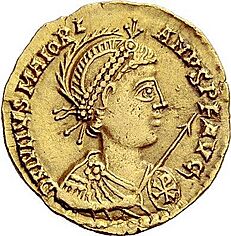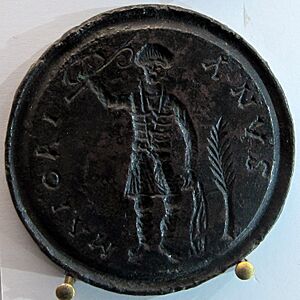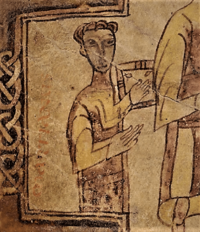Majorian facts for kids
Quick facts for kids Majorian |
|||||
|---|---|---|---|---|---|
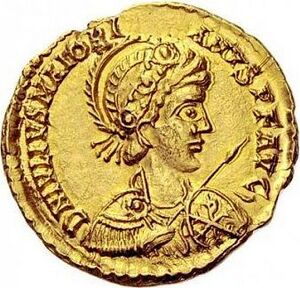
Solidus of Majorian, marked:
d·n· iulius maiorianus p·f· aug· |
|||||
| Roman emperor in the West (unrecognized in the East) |
|||||
| Reign | 28 December 457 – 2 August 461 | ||||
| Predecessor | Avitus | ||||
| Successor | Libius Severus | ||||
| Eastern emperor | Leo I | ||||
| Died | 7 August 461 Dertona, Roman Empire |
||||
|
|||||
| Father | Domninus (possibly) | ||||
| Mother | Daughter of Majorianus, magister militum | ||||
| Religion | Chalcedonian Christianity | ||||
Majorian (Latin: Iulius Valerius Maiorianus) was a Western Roman emperor who ruled from 457 to 461. He was a strong military leader in the Western army. Majorian became emperor after removing the previous emperor, Avitus, in 457 with help from his friend Ricimer.
At the time, the Western Roman Empire was very small. It mostly included Italy, Dalmatia, and some parts of Hispania and northern Gaul. Majorian worked hard for three years to fight the Empire's enemies. Sadly, he died in 461 due to a plot against him. After his death, the emperors who followed him until the fall of the Empire in 476 were mostly controlled by other powerful generals or the Eastern Roman court.
Majorian achieved important victories. He stopped a Vandal attack on Italy in 457. He also defeated the Visigoths in Gaul, saving the city of Arelate. He made the Goths allies and brought Hispania back under Roman control. Meanwhile, another general, Marcellinus, helped him take back Sicily.
Majorian then fought the Burgundians, taking back Lugdunum (modern Lyon). He also brought the people of Gaul back into the Empire. His general, Nepotianus, also reconquered parts of the Suebian Kingdom in Hispania.
In 460, Majorian went to Hispania to prepare a large fleet to invade Africa. However, the Vandals paid traitors to destroy his fleet. This forced Majorian to return to Italy.
During his rule, Majorian made many changes to reduce corruption. He also worked to rebuild the government and protect ancient buildings. These changes made some powerful senators unhappy. This unhappiness was used by Ricimer to plot against Majorian, leading to his death in 461.
Historians like Procopius said Majorian was "the best of all Roman emperors." Another writer, Sidonius Apollinaris, said he was "gentle to his subjects" and "terrible to his enemies."
Contents
Majorian's Early Life and Family
The story of Majorian's life and rule is well known compared to other Western Roman Emperors of his time. We learn about him from old writings called chronicles. These include works by Hydatius, Marcellinus Comes, Priscus, and John of Antioch.
We also have special sources that tell us more about Majorian. A Gallo-Roman writer named Sidonius Apollinaris knew the Emperor. He wrote a special poem praising Majorian, which tells us a lot about his early life. We also have twelve of Majorian's laws. These laws help us understand the problems he tried to fix during his time as emperor.
Majorian was likely born after 420 AD. He came from a military family in the Roman Empire. His grandfather, also named Majorian, was a high-ranking general. He served under Emperor Theodosius I. Majorian's mother was the general's daughter. She married an officer who managed money for Aetius, a very powerful general. They named their son Majorian to honor his grandfather.
Majorian started his military career under General Aetius. He went with Aetius to Gaul (modern France). There, he met two other officers who would become important in his life: Ricimer and Aegidius. Majorian showed great bravery in battles. He helped defend the city of Tours. He also fought bravely in a battle against the Franks in 447 or 448 AD.
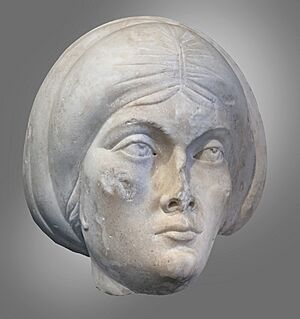
Around 450 AD, Emperor Valentinian III thought about having his daughter, Placidia, marry Majorian. Valentinian had no sons, so he needed an heir. Marrying Majorian would have made Valentinian stronger. It would also have helped solve the problem of who would rule next. Majorian could have led the army himself, without relying on a powerful general like Aetius.
This plan was meant to stop barbarian leaders from becoming too powerful. However, it went against Aetius's own plans. Aetius wanted his son, Gaudentius, to marry Placidia. So, Aetius stopped Majorian's military career. He sent Majorian away from his staff to live a private life. Some say Aetius's wife was jealous and feared Majorian would become too famous.
Majorian returned to public life in 454 AD. That year, Emperor Valentinian III killed Aetius. Valentinian feared Aetius's troops might revolt. So, he called Majorian back to help calm any unrest. The next year, Valentinian III was killed. There was a fight for the throne because there was no clear heir. Majorian was a possible choice for the throne.
In the end, Petronius Maximus became the new Emperor. He was a senator involved in Valentinian's death. To make his position stronger, he forced Valentinian's widow to marry him. He also made Majorian a high-ranking commander of the imperial guard.
Becoming Emperor
The Revolt Against Avitus
Petronius Maximus ruled for only a few weeks. He was killed during the Vandal sack of Rome in May 455 AD. Avitus, a noble from Gaul, became the next emperor. He had the support of the Visigoths. Majorian and Ricimer first supported Avitus. But Avitus lost the trust of the Italian nobles. So, the two generals rebelled against him.
First, Majorian and Ricimer killed Remistus, a general Avitus had put in charge of defending the capital, Ravenna. Then, Ricimer defeated Avitus's army near Placentia. He captured Avitus and forced him to give up the throne. Finally, Majorian caused Avitus's death in early 457 AD.
Majorian Becomes Western Emperor
After Avitus died, the Western throne was empty. It was up to the Eastern Roman Emperor to choose the next ruler. But Emperor Marcian died on January 27, 457 AD. His successor in the East was Leo I, who decided to rule alone for a while. On February 28, Majorian became a top military commander. Ricimer became a powerful noble and military commander. This was likely Majorian taking power, not Leo appointing him.
While things were uncertain, a group of 900 Alemanni invaded Italy. They came from Raetia and reached Lake Maggiore. Majorian sent his troops to stop them. His commander, Burco, defeated them.
This victory was seen as Majorian's own. The army cheered for Majorian as Emperor. This happened around April 1, outside Ravenna. The poet Sidonius Apollinaris wrote that Majorian at first did not want to be emperor. But he was formally declared emperor on December 28. Majorian became consul for the year 458. This was a common tradition for new emperors. However, the Eastern Roman Empire did not officially recognize him as emperor.
Protecting the Empire
Defending Italy
In summer 457, a group of Vandals attacked Campania in Italy. They landed near the Liri river and began to rob and destroy the area. Majorian personally led the Roman army to victory against them. He chased the Vandals back to their ships, killing many of them.
After this attack, Majorian realized he needed to protect Italy, the main part of his Empire. He decided to make its defenses stronger. He passed a law about the right to carry weapons. He also passed a law to stop problems during chariot races. Both these laws are now lost.
He then made the army stronger. He hired many barbarian soldiers from groups like the Gepids, Ostrogoths, Huns, and Burgundians. Finally, he rebuilt two fleets of ships. This was important because the Vandals had a strong navy.
Taking Back Gaul
After making Italy safe, Majorian focused on taking back Gaul. When the emperor Avitus was removed, Gaul did not recognize Majorian as the new ruler. An old inscription from Lugdunum (modern Lyon) shows this. It only lists the Eastern Emperor Leo I as consul for 458, not Majorian. This means Majorian was not seen as the lawful Western Emperor there.
Also, after Avitus died, the people of Lugdunum asked Leo, not Majorian, for lower taxes. There was also a failed attempt to take power in Gaul around this time.
In late 458, Majorian entered Gaul with a strong army. He led the army himself, leaving Ricimer in Italy. He chose Aegidius and Nepotianus as his helpers. The Roman army defeated the Visigoths under King Theodoric II at the Battle of Arelate. This forced the Visigoths to leave Septimania and go west. The Roman victory was a big one. Under a new agreement, the Visigoths had to give up their lands in Hispania. They also became allies of the Empire. Majorian made his trusted general Aegidius the new military commander of Gaul.
With the help of his new allies, Majorian entered the Rhone Valley. He took control of the people there, some by fighting and some by talking. He defeated the Burgundians and captured the city of Lugdunum. The city was fined heavily. Even though some nobles in Gaul had supported Avitus, Majorian wanted to make peace. He gave the people of Lugdunum the tax reduction they had asked Leo for.
Campaigns in Hispania
After the Vandal sack of Rome (455), the Visigoths had taken over Hispania. They claimed to do this for the new Western Emperor Avitus, but they really controlled the land themselves. Majorian planned to take back Hispania. He wanted to use it as a base to conquer Africa. This rich province, which supplied grain to Rome, was controlled by the Vandals.
Some stories say Majorian, who was known for his fair hair, dyed it black. He then went to the Vandal king Genseric pretending to be an envoy from the Western Emperor. Genseric tried to impress him by showing off his weapons. This story might be a legend, but it shows how carefully Majorian planned his invasion. He gathered information about the enemy. He also built a fleet of 300 ships to help his army take back Hispania and invade Africa.
During these preparations, Majorian sent his general Marcellinus to Sicily. Marcellinus had an army of Huns to take the island back from the Vandals. Marcellinus had been mostly independent since the death of Aetius. But Majorian convinced him to accept him as Emperor and help in the recovery of the Empire.
The campaign began with an attack on the Suebi in North-Western Hispania. This lasted through 459. Majorian gathered his main army in Italy. He then went through Gaul and arrived at Theodoric's court in Toulouse in May 460. Genseric, fearing the Roman invasion, tried to make peace. But Majorian refused because he had spent so much money preparing for the war. Genseric then decided to destroy his own land in Mauretania and Numidia. He poisoned water sources and burned fields. He thought the Roman army would land there. He also ordered his navy to prepare attacks.
Meanwhile, Majorian was conquering Hispania. His generals defeated the Suebi and captured cities. The Emperor went through Caesaraugusta (Saragossa). Finally, he reached Carthaginiensis. There, his fleet was docked near Elche. But traitors paid by the Vandals destroyed the ships.
In autumn 460, Majorian had no fleet for the invasion. He canceled the attack on the Vandals. He then made peace with Genseric. This likely meant recognizing that the Vandals controlled Mauretania. Majorian sent his expensive troops home. He went to Arelate to spend the winter. He knew he might not be welcomed in Italy after the defeat.
Changes at Home
Majorian's policies for his own country are known from his laws. These laws were collected in a book called the Breviary of Alaric.
Money and Coins
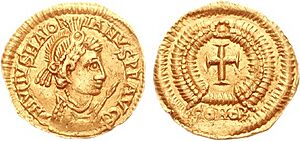
Majorian knew he needed the support of the wealthy senators to rule well. He wanted to give them back their important role in politics. But he also wanted to stop the senators from abusing their power. Many senators only cared about their own local interests. They even refused to pay taxes and kept the taxes they collected for themselves. This tax evasion hurt the smaller landowners and citizens.
For example, local officials called decurions had to pay the imperial treasury for any taxes not collected. Sometimes, they got into so much debt that they left their positions. Majorian also canceled old tax debts. He knew that people could not pay new taxes if they still owed huge amounts from the past.
On March 11, 458, Majorian issued a law to forgive all past tax debts for landowners. This law also stopped public officials from collecting taxes if they had a history of keeping the money. Only governors were allowed to collect taxes. Another law was issued to fix the tax system. It told judges not to cheat the imperial treasury by keeping some of the collected money.
The Emperor also wanted to fix the government's administration. On May 8, 458, Majorian issued a law to bring back the office of the "defender of the municipalities." This official protected citizens' interests in legal cases against the government, especially about taxes. This job still existed, but it was not working well. The same officials who cheated people often held it.
Another law was issued on November 6 to strengthen the role of the decurions. This law forgave past mistakes made by decurions. It also stopped them from leaving their positions or selling their land.
Majorian made coins from gold, silver, and bronze. Many gold coins were made. On these coins, the Emperor is usually shown with a helmet, a spear, a shield, and a Christian symbol. The first gold coins showed both Majorian and Leo I. This showed that the two emperors recognized each other. Coins were made in Ravenna, Milan, and Arelate.
Silver coins were mostly made in Gaul. Some think these were made by Aegidius after Majorian's death. This would show that Aegidius did not recognize Majorian's successor. Majorian also made many heavy bronze coins.
Family Policies
The spread of Christianity in the Empire changed some family traditions. In many rich families, daughters were forced to become nuns. This was done so that the family's wealth would not be split up by giving dowries for marriages. Majorian thought this was bad for the Empire. It reduced the number of Roman children. It also led to secret relationships. On October 26, 458, the Emperor issued a law.
This law said that women had to be at least 40 years old to become nuns. It also gave women who were forced to become nuns the same rights to their parents' inheritance as their brothers and sisters.
To help with the problem of fewer Roman citizens, Majorian also looked at young widows without children. Many did not remarry because of the influence of the church. They would leave their money to the church in their wills. Majorian's law stopped young widows from becoming nuns.
Majorian also said that a marriage was not valid without a dowry and gifts exchanged before the wedding. He also stopped the practice of asking for pre-wedding gifts that were much more valuable than the dowry.
Working with the Senate
When Majorian became emperor, Gaul did not recognize him. But when he took back the province, he chose to forgive them. Majorian understood that the previous emperor, Avitus, had made a mistake. Avitus had only promoted and trusted senators from Gaul, his home region. He favored them over the senators from Italy.
Majorian decided to win over the rich and noble families of Gaul. He included them in the government, along with the Italian nobles who had supported him. For example, he chose important officials from both regions.
In his first year (458), Majorian was consul himself. In the second year, he appointed his powerful general, Ricimer. Then, for 460, he chose a senator from Gaul, Magnus. For the next year, he chose an Italian senator, Severinus. This showed he was fair to both groups.
Majorian also showed great respect for the Roman senate. Before he became emperor, he promised the senators he would not listen to false accusations. These accusations were feared because emperors could use them to bring down powerful people. Majorian kept his promises.
Protecting Rome's Monuments
Since the early 4th century, Rome's monuments were often used as quarries for building materials. This was cheaper than bringing materials from far away. It was also easier, especially when the Vandals controlled the sea. Roman officials would allow people to use marble, stone, and bricks from old buildings for new construction.
Majorian saw that this was destroying Rome's beauty. He passed a law called "Public Buildings" on July 11, 459. This law was sent to the city governor of Rome. The punishment for judges who allowed old public buildings to be destroyed was a large fine of gold. Their helpers would be whipped and have their hands cut off. Those who took materials from public buildings had to return them. The Senate could decide if an old building truly needed to be torn down. If it was, the Emperor could still order that the materials be used for other public buildings.
Majorian's Final Days
Majorian's end was similar to that of Avitus. Just as Avitus was betrayed by Ricimer and Majorian, Majorian's fate was decided by his army being sent home and a plot by Ricimer. While the Emperor was away from Italy, Ricimer gathered powerful nobles who were unhappy with Majorian. Majorian's laws had upset some powerful aristocrats.
After spending the winter and spring in Arelate, Majorian left in the summer with a small group of guards. He likely planned to go to Rome. He traveled through southern Gaul and Liguria. But then he changed direction and went north. He probably heard that Ricimer was coming to meet him. He wanted to reach Dertona and then go to Ravenna. However, Ricimer met him in Dertona on August 2. Majorian was arrested and removed from power.
The Emperor was stripped of his royal clothes and crown. He was beaten and treated badly. After five days, on August 7, Majorian died near the river Iria. The city of Tortona has a building believed to be Majorian's tomb. However, some writings say Majorian did not receive a proper burial.
Ricimer claimed that Majorian died of natural causes. He waited three months before choosing a new emperor. He picked Libius Severus, a senator who was not very powerful. Ricimer likely thought he could control him. The new emperor was not recognized by the Eastern Emperor Leo I. He was also not recognized by Majorian's generals: Aegidius in Gaul, Marcellinus in Sicily and Illyria, or Nepotianus in Hispania.
Majorian's Legacy
Historian Edward Gibbon said Majorian was "a great and heroic character." He believed Majorian was a rare good leader in a difficult time. The Encyclopædia Britannica also calls him "the only man to hold that office [emperor] in the 5th century who had some claim to greatness."
Images for kids
See also
 In Spanish: Mayoriano para niños
In Spanish: Mayoriano para niños
 | Janet Taylor Pickett |
 | Synthia Saint James |
 | Howardena Pindell |
 | Faith Ringgold |


